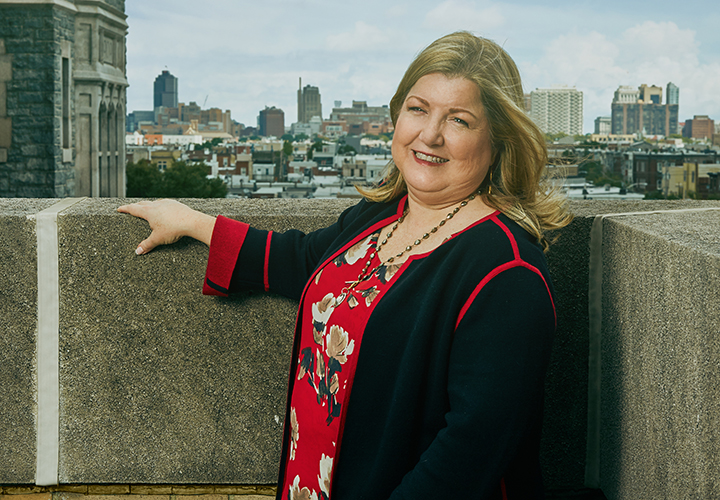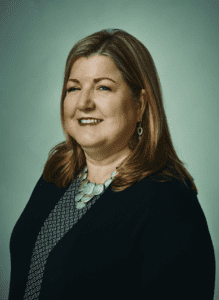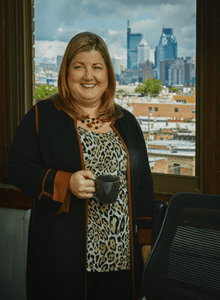
Michelle Braden prioritizes learning and development for TELUS International’s 30,000 global employees.
by Agatha Bordonaro
October 31, 2018
Growing up in Overland Park, Kansas, a busy suburb of Kansas City, Michelle Braden didn’t have dreams of becoming a learning professional. In fact, she didn’t take much to education in general.
“I was probably one of the worst students,” Braden said, laughing. “I always had a hard time staying engaged.”
But that very quality is, today, what makes her a powerhouse in the learning industry, as she continuously evaluates what keeps people engaged and how she can improve the learning experience. “I guess if I were a good student right off the bat,” Braden said, “it probably wouldn’t have helped me get to where I am.”

An Unconventional Path
It’s been an interesting path that’s brought Braden to her current role as global vice president and chief learning officer for TELUS International, a worldwide provider of customer-service outsourcing and IT services. She began her career as a computer programmer, fixing bugs and writing code. Naturally talented and hardworking, she advanced quickly, but the higher she rose within the field, “the more isolated I became,” she said. The self-proclaimed “people person” increasingly enjoyed opportunities to work with others, gradually becoming the go-to professional for any client-facing work.
“Whenever they needed someone to explain something to a client about the software or some solution we created, they always asked me to do it. I just had a way of taking technical stuff and putting it into very simple terms,” Braden said. “It eventually got to where I was like, ‘This is pretty cool, being out in front of people, helping them learn and grow.’ ”
Braden moved into marketing and sales, where she was responsible for teaching clients how to use the company’s computer equipment. One client had a developmental rotation program that resulted in Braden having a new employee to teach every few months. With no official training material to speak of, Braden decided to take matters into her own hands and created her own.
“I built a whole course to teach the customers,” she said. “This was back in the day of overlays; it wasn’t like today — no Power-Point!”
Senior management got wind of Braden’s handiwork and asked her if she would relocate to the company’s headquarters in San Diego to help educate others. She willingly accepted. A few years later, the head of the company’s Latin America group created a training-management position specifically for her, making it her first official role in the L&D space — and a global one at that. The learning strategy Braden created in this role was so successful that it not only boosted the business’s bottom line but also won her the company’s president’s achievement award.
“It was the first time that I felt like, ‘OK, I have something different to add here and someone’s going to value it,’ ” Braden said.
A Simple Approach
Braden has always been a self-starter. More than a decade into her career, with degrees from junior college and technical school under her belt, she decided to go back to school to earn her bachelor’s degree — and then continued on for an MBA from the New York Institute of Technology, from which she graduated with high distinction. “Once I get into learning, I get really into it and I can’t stop,” she joked.
“She’s a very hardworking individual,” said Estuardo Ligorria G., vice president of operations at TELUS International Central America, based in Guatemala. “She has a work ethic like very few people. She’s very detail oriented. She’s very good at working with different departments. And she doesn’t shy away from big challenges.”
This straightforward, from-the-ground-up approach is one of the things that makes Braden so successful as a learning professional. And she credits her son with helping her refine it.
“Several years ago, when my son was small and I was first really getting into global learning, I remember him saying to me one day, ‘Mom, I wasn’t born knowin’ it!’ And it struck me when he said that because nobody was born ‘knowin’ it,’ ” she said. “It changed my approach because I started thinking, ‘I need to go back to some of the basics and make sure people really have them.’ You can’t assume that everyone knows how to do things or knows what you do. Now I take a step back and really look at the learner experience and where they’re coming from.”
This same approach applies to Braden’s management style, which puts the focus on her team members and their needs.
“When I have a one-on-one with her, it’s very clear it’s my meeting. It’s my opportunity to set the agenda,” said Margot Cook, senior manager for learning excellence solutions and one of Braden’s direct reports. “There may be times where she has things for me to handle, yet, unless it’s urgent, those things come second. She gives me the support that I need when I need it, but doesn’t necessarily micromanage.”
Investing in People at TELUS International
After moving from Xerox to SAP, where she led the organization’s global learning excellence team, Braden was recruited to TELUS International in 2012 with a threefold objective: to build a leadership pipeline; to grow the skills of the entire TELUS workforce; and to help create custom learning curricula for clients. She also undertook the challenge to centralize the company’s L&D function, bringing together disparate region heads into one department and growing the team from 50 in 2013 to more than 400 today.

“The new way of doing business in our industry is digital transformation. But even though some things are automated or digitized, you still need human beings to resolve the more difficult issues and have the skills and knowledge to support all that technology,” explained Ligorria. “Talent itself is one of the most coveted resources in the emerging digital age. We’re investing in our people be-cause we believe that’s the road to success.”
“A lot of contact centers don’t do that,” added Cook. “We are in an industry that’s so competitive. It’s very easy for people to get poached. But we have a higher retention rate [than average]. People definitely feel that there are learning opportunities here, that this is a place where they can grow. A lot of other contact-center companies don’t give their frontline people those opportunities. It has a lot to do with the work that Michelle and the team have done globally.”
In fact, TELUS International’s attrition rates are up to 50 percent lower than the industry average in most of the regions where the company operates, according to the company’s 2017 employee engagement survey, which is administered by Aon Hewitt. The report also found that 87 percent of TELUS employees worldwide believe the company strongly supports the learning and development of its team members (that’s 3 percentage points higher than Aon Hewitt’s “best employers” benchmark for that year), while 76 percent agree with the statement, “My future career opportunities here look good” (four percentage points higher than the benchmark). Meanwhile, global engagement is 83 percent — a leading industry score.
Learning Inside and Out
TELUS International’s internal success is due in part to a key initiative that Braden and her team rolled out in 2015: the Learning@TI Roadmap, which is a series of development programs that target employees at different stages of their careers. It kicks off with IEvolve for all new frontline team members, then moves to IAspire for emerging leaders, IExcel for managers and directors, and finally ILead for senior leaders. Each program consists of a combination of online, offline, in-person, peer-to-peer, mentoring and coaching opportunities.
“I’ve been in companies before where nobody knew what you had to do to get to the next level other than network,” Braden said. “This way, people know how to gain the skills and knowledge they need so that they are better positioned to get that next job. Plus, we found that the people who have gone through this program and have been certified and then promoted are hitting the ground running.”It’s no surprise that in 2016, just a year after launching, the Learning@TI Roadmap won an ATD Excellence in Practice award in the Organizational Learning and Development category.
Other popular programs Braden has helped launch at TELUS include the ongoing Learn & Grow program, which provides continuous learning opportunities around soft skills such as leadership and management, and INsession, which consists of TED-Talk-like presentations by anyone within the organization. Braden herself has given many INsession talks, Cook pointed out. “She leads by ex-ample and tries as best as possible to reach as many people as she can,” she said.
Braden’s influence doesn’t stop with internal successes. She and her team regularly create custom learning solutions for TELUS International’s clients. One such client, Fitbit, the maker of the wearable fitness tracker, came to Braden’s team looking for a highly specialized, realistic digital emulator that would allow customer service agents without access to actual Fitbit trackers or the Fitbit app to learn the technology in a hands-on way and provide knowledgeable service to customers. Braden and her team unveiled the first solution in July 2017 and positive results have already been rolling in.
“We have a lot of anecdotal feedback from the agents in terms of how it made their lives and jobs less stressful and more fun,” said Chris Underwood, director of customer support operations and training for Fitbit.
“So far feedback has been really good,” said Marjorie Etter, manager of customer support training at Fitbit, who worked on the design and implementation of the emulator. “Every project has its challenges, but when you’re able to collaborate with respect and great communication, it just makes everything so much easier. We made decisions together, we worked together, we innovated together, we strategized together. And the maintenance work is something we’re doing together.”
Future Goals
As customer-service agents are increasingly called upon to handle more complex issues, Braden is focused on continuing to raise the skills of the entire TELUS International workforce.
“If you really have some issue you need to speak to someone about, you don’t want to be speaking to a robot. You want to speak to a person,” she said. “So my team is focused on how we can support our frontline team members in providing that great customer experience.”
She added it’s also critical for HR and L&D professionals not to get too enamored with new tech tools — particularly since there are so many coming to market — and continue to put the learner’s needs first.
“The challenge is not to get blindsided or distracted by these shiny new pennies, like AI [artificial intelligence], but to figure out how you can prepare yourself to use them,” she said. “We have a lot of leaders who have come up solely through the education or HR ranks, and they don’t have a technology background — I think they’re going to be at a disadvantage. So they have to start to learn more about the technologies, and how to leverage them for learning, and how to put learning into the flow of work for the individual.”
It’s also wise not to get too attached to any one tool or method, since tomorrow’s challenges may be different from today’s. But that’s the thing about the learning industry that Braden loves most.
“It seems like just when you think it’s going to be the same, next year it’s not. It just keeps growing and it keeps expanding,” she said. “That excites me.”



